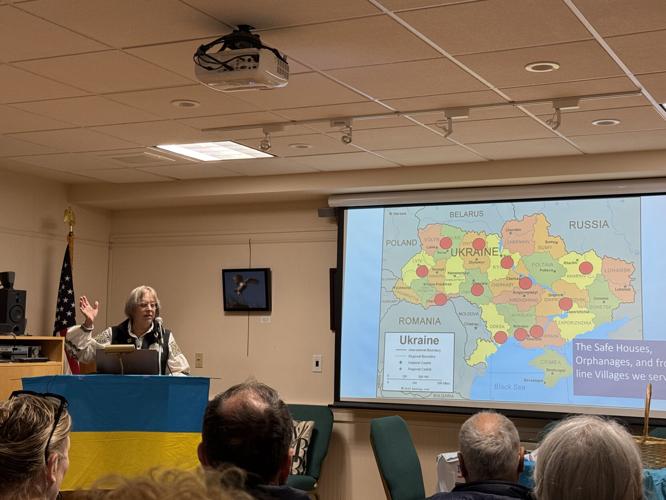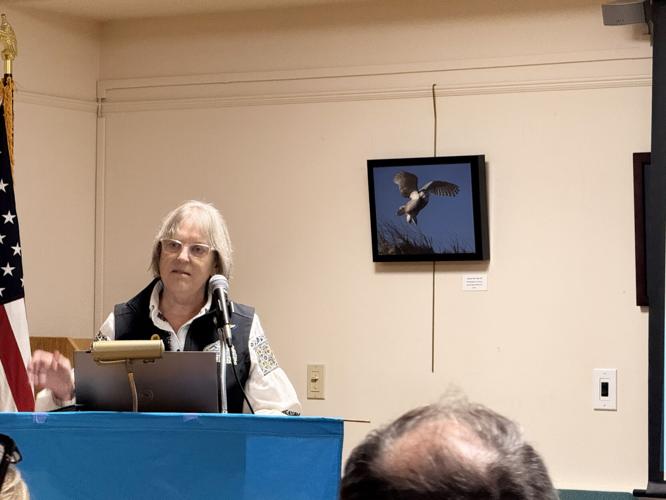Volunteers with Common Man for Ukraine, a nonprofit organization which works to support the well-being of children in the war-torn eastern European country, will soon make their 14th trip across the pond to continue their work.
Alex Ray, founder and patriarch of the Common Man family of restaurants, has quietly spent years traveling between the Lakes Region and Poland, facilitating the delivery of much-needed aid into Ukraine. Since the 2022 invasion, they’ve made great strides in supporting that mission, and have expanded the services they’re able to provide.
Working with fellow Rotarians, mostly in Poland but who also hail from elsewhere, Common Man for Ukraine has delivered over four million pounds of non-perishable food, making the trip across the border in over 750 trucks, providing 10,000 sleeping bags and hundreds of generators to communities on the frontlines.
“And in they go,” Common Man for Ukraine volunteer Susan Mathison said. “Into the war zone, to feed children they don’t know.
“And all of our trucks have come home safely,” Mathison told a crowd at the Moultonborough Public Library Monday night. The group presented on successes and challenges they’ve faced doing the work since 2022. About 30 people came to hear them out during the event, organized in part by the Moultonborough Democrats.
While many people are familiar with details of the war effort — it grabs headlines and television program features nearly every day — far fewer hear about the toll endured by civilians, most of whom are children or widowed mothers. Those are the people Common Man for Ukraine seeks to help. And they’ve made a real impact.
Hundreds of volunteer truck drivers, warehouse workers, medical and psychological professionals, teachers and donors have kept the effort afloat, despite the typical changes in the political landscape over the nearly four-year period.
It all started right around the eve of the Russian invasion. Ray, Mathison, Lisa Mure and other friends were aghast, and wondered how they might be able to lend assistance.
“Nobody really acted at the beginning of this invasion into Ukraine,” Mure said. “Alex said, ‘I think that we should just go there.’”
So go he did, in February 2022. A Rotarian in Plymouth, Ray connected with others abroad and eventually, with their help, made his way into Ukraine for the first time. When he returned, he started advocacy. In 2025, they’ve raised $1.1 million, more money than in each of the previous three years. In total, the effort has raised $4.7 million.
The journey for volunteers with Common Man for Ukraine begins in earnest once they’ve landed overseas — they purchase goods in bulk in Europe, and truck them into Ukraine, trekking 2,000 miles to the frontlines, where safe houses and orphanages are located sporadically. They hand out supplies and provisions to the residents of these towns and villages, who live in constant fear of bombing.
“Desperate, desperate people,” Mathison said. “They know winter’s coming, they know the war is ongoing, they have kids.”
Because of the Goliath volunteer effort, around 1,400 Ukrainian children have been afforded trauma counseling, medical services and new shoes. Groups of about 30 children are transported away from the frontlines to Poland each month, and spend three weeks at counseling retreats. Since August, widowed mothers have gone, too — they serve about a dozen women at a time; 50 in total, so far.
“We bring food, generators, sleeping bags and love to the frontlines,” Mathison said.
And, with no end to the war in sight, Common Man for Ukraine volunteers will head out again on Monday, Dec. 8. They’ll fly into Kraków, Poland, drive to a border town, and then cross into Ukraine. It’ll probably take them about a 36 hours to reach the front, where they’ll have coordinated with local volunteers to distribute food and supplies. They should return 12 days later.
Ukraine is sometimes referred to as Europe’s “breadbasket,” due to the historically high volume of production of grain, corn and sunflower oil, among other products. Mathison and Mure said Monday that, as the Russian army retreats from an area, they’ll take care to mine the agricultural fields, “so that they could no longer have an economy” in Ukraine.
Villages are filled with young children and the elderly, as fighting-age men having been conscripted into the war effort. They spend their days mired in the trenches at the front.
“They’re a little more modern,” Mathison said of the trenches. “They have some landscape cloth, but I’m sure they’re hell to live in.”
When Mure returns to Ukraine, she makes sure to visit Saints Peter and Paul Garrison Church in Lviv. There, Ukrainians hang portraits of their war dead on large easels in memoriam. Every town and village in Ukraine have memorials which display prominently the faces of dead soldiers, the volunteers said. Though the number of Ukrainian dead is not released by their government, Mure said it’s in the “hundreds of thousands.”
“Each time I go back to Lviv, I go back to this church, and there’s another five easels,” Mure said. “It’s a stark reminder of the horrors they’re going through every day.”
“I think it’s important to see every face.”



















(1) comment
I am no supporter of the war in Ukraine, but I am a supporter of angels like these providing assistance in the face of grave danger.
Welcome to the discussion.
Log In
Keep it Clean. Please avoid obscene, vulgar, lewd, racist or sexually-oriented language.
PLEASE TURN OFF YOUR CAPS LOCK.
Don't Threaten. Threats of harming another person will not be tolerated.
Be Truthful. Don't knowingly lie about anyone or anything.
Be Nice. No racism, sexism or any sort of -ism that is degrading to another person.
Be Proactive. Use the 'Report' link on each comment to let us know of abusive posts.
Share with Us. We'd love to hear eyewitness accounts, the history behind an article.